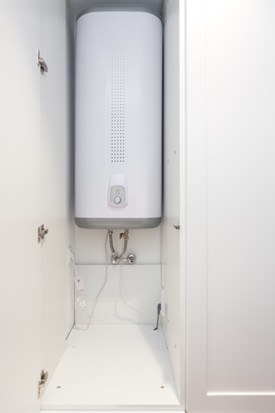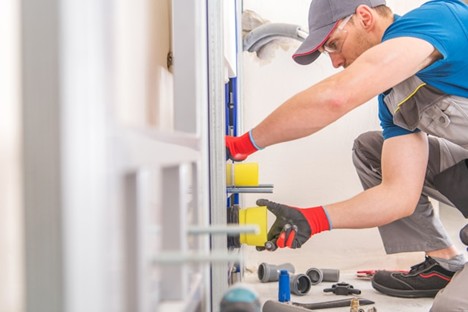
Few household systems are as central to daily life as your hot water supply. From morning showers and dishwashing to laundry and cleaning, we rely on heated water for countless routines. But like any appliance, a heating tank eventually shows signs of wear. Some issues can be fixed with relatively simple service, while others suggest that replacement is the smarter move. Understanding when to choose water heater repair and when to invest in a new unit can save money, improve efficiency, and provide peace of mind.
A heating tank works quietly in the background, storing and warming water so it’s available on demand. Because it’s always in use, this system faces constant pressure and exposure to minerals, heat, and water flow. Over time, these factors can create sediment buildup, wear on the internal lining, or stress on components such as thermostats and heating elements. Although tanks are designed for years of service, even the most durable models eventually face performance issues.
Not every problem means it’s time for a costly replacement. In many cases, a targeted repair restores performance and adds years of life to the system. If you notice inconsistent water temperatures, for instance, the problem may lie with a thermostat that needs recalibration or replacement. Unusual noises such as rumbling or popping often result from sediment buildup inside the tank, which can be addressed with professional flushing.
Minor leaks from valves or fittings are another example where repairs may suffice. A loose drain valve or a worn pressure relief valve can often be replaced without much expense. Even problems like discolored water don’t always point to tank failure; sometimes the issue stems from aging plumbing rather than the tank itself. In these scenarios, professional service can return the system to full functionality without the need for a new unit.
Although repairs are practical for many issues, there comes a point when replacement is the safer and more economical option. One of the strongest indicators is age. Most tanks last eight to twelve years, depending on maintenance, water quality, and usage. If yours is nearing or has exceeded this range, ongoing repairs may only serve as temporary fixes. An older system is more likely to break down suddenly, potentially leaving you without hot water at an inconvenient time.
Persistent leaks are another warning sign that the tank itself is deteriorating. Unlike a faulty valve, cracks or corrosion in the tank wall cannot be repaired. Even small leaks from the body of the unit signal the end of its service life. Rising energy bills are also a clue that replacement may be necessary. As tanks age, they lose efficiency due to insulation breakdown, sediment buildup, and worn components. The result is higher operating costs and reduced performance.
Frequent repairs themselves can justify replacement. If you find yourself calling for service multiple times a year, the cost of continual fixes often surpasses the investment in a new system. Instead of pouring money into an aging unit, upgrading ensures reliable performance, better efficiency, and fewer unexpected disruptions.
Homeowners often hesitate to replace their heating tank because of the upfront expense. However, it’s important to weigh that cost against long-term financial considerations. A new system may come with a higher price tag initially, but improved efficiency translates to lower monthly utility bills. Over the lifespan of the unit, these savings can be significant.
Additionally, modern tanks are designed with better insulation and more advanced technology, reducing standby heat loss and maintaining consistent temperatures. This means less wasted energy and greater comfort. In contrast, an older tank may cost more each year to run, even if the repairs themselves seem affordable. Over time, the cumulative expense of inefficiency and frequent service calls can far exceed the cost of replacement.
Beyond convenience and cost, safety plays a critical role in deciding whether to repair or replace. Tanks that are corroding, leaking significantly, or showing electrical or gas-related issues can pose risks. Gas-powered units with failing pilot lights or burners may leak carbon monoxide, while electrical models with faulty wiring create fire hazards. A compromised tank structure also raises the risk of flooding if the system fails suddenly.
If a technician identifies structural deterioration or recurring electrical or gas malfunctions, replacement is the safest course of action. The peace of mind that comes from knowing your home and family are protected is often worth the investment in a new unit.
Modern heating tanks are far more energy-efficient than those manufactured even a decade ago. Replacing an outdated system reduces energy consumption and lowers your household’s carbon footprint. Some homeowners also qualify for tax credits or rebates when upgrading to energy-efficient models, further offsetting the cost. In contrast, keeping an inefficient system running with repairs prolongs the environmental burden of excessive energy use.
From an ecological perspective, replacement not only benefits your household budget but also contributes to broader sustainability goals. If environmental impact is part of your decision-making process, this can be an additional factor in favor of upgrading.

The decision between repair and replacement is not always straightforward. Start by assessing the age of your current system, the frequency of recent repairs, and the severity of current issues. Consult with a licensed professional to diagnose problems accurately and provide an honest estimate of remaining lifespan. An expert can help you determine whether a repair will extend service meaningfully or whether replacement is a smarter long-term strategy.
It’s also worth considering your household’s future needs. A growing family may benefit from upgrading to a larger or more advanced model, while a smaller household may choose a more compact or efficient option. Factoring in lifestyle changes ensures that your decision not only addresses today’s concerns but also supports your needs for years to come.
Even if your system is still functioning, planning for eventual replacement prevents you from being caught off guard by sudden failure. Researching options, budgeting in advance, and scheduling replacement on your terms ensures a smoother transition. Waiting until the tank fails completely often leads to rushed decisions, limited availability, and higher costs for emergency service.
Proactive planning allows you to choose a model that aligns with your household size, energy goals, and budget. It also provides time to explore available rebates or financing options. By preparing ahead, you maintain control over the process rather than reacting under pressure.
Determining whether to repair or replace your household heating tank requires balancing cost, safety, efficiency, and long-term needs. While minor issues such as faulty valves, thermostats, or sediment buildup can often be resolved with repairs, recurring problems, structural damage, and advanced age point toward replacement as the wiser choice.
Ultimately, the best decision combines professional guidance with a clear understanding of your household’s priorities. By recognizing the signs early and evaluating your options thoughtfully, you can ensure a reliable supply of hot water, greater energy efficiency, and peace of mind for years to come.